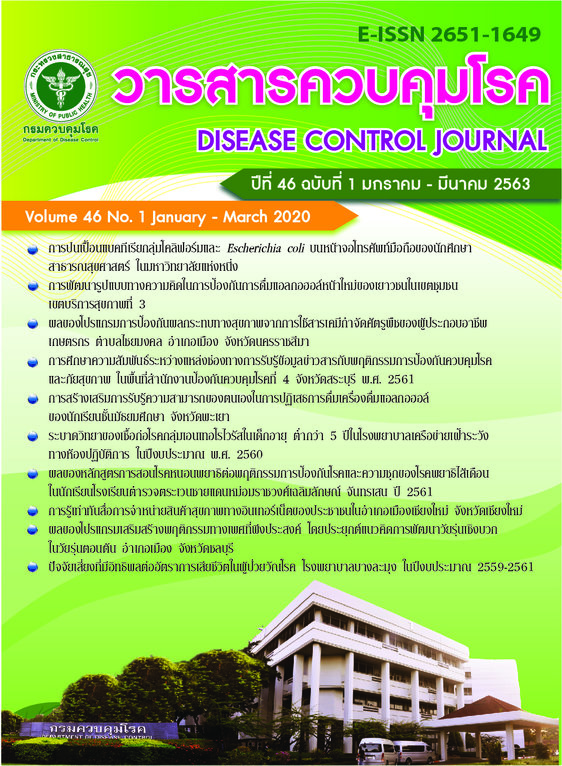Media literacy concerning an online health product distribution of people living in Mueang District, Chiang Mai Province, Thailand
DOI:
https://doi.org/10.14456/dcj.2020.7Keywords:
media literacy, health product, internetAbstract
This research aims to study media exposure behaviors, media literacy and factors affecting media literacy on health product distribution on the internet of people in Mueang District, Chiang Mai Province. Data was collected by using questionnaires and analyzed by descriptive statistics, inferential statistics, content analysis, and thematic analysis. The results of media exposure behaviors showed that most of the people are exposed to the media every day, use smartphone and spend 30 minutes to 1 hour each time for media exposure or purchasing products. The purpose of purchasing health products is product trials, most of the people purchase food supplements 1-2 pieces at a time and the average value is 1,300 Baht. In addition, the analysis of media literacy and personal factors affecting media literacy found that overall, media literacy of people is at a moderate level (x ̅ = 3.26±0.74). Gender and medical condition of people have no effect on media literacy (p=0.77 and 0.92, respectively), while age, education, and monthly income of the respondents have a statistically significant effect on media literacy (p=0.02, 0.00, and 0.02, respectively).
Downloads
References
Academic Resources and Information Technology Center, Nakhon Sawan Rajabhat University. Chapter 2. Introduction on the internet [Internet]. Nakhon Sawan: Academic Resources and Information Technology Center, Nakhon Sawan Rajabhat University; 2013 Aug [cited 2017 Mar 18]. 17 p. Available from: https://comqa.nsru.ac.th/comqa/document/internet58.pdf (in Thai)
Electronic Transactions Development Agency (Public Organization). ETDA’s recently-released results of the survey on internet behavior and e-commerce values indicate Thailand’s readiness to become the leader of ASEAN e-commerce [Internet]. 2017 [cited 2018 Mar 18]. Available from: https://www.etda.or.th/content/thailand-internet-user-profile-2017-and-value-of-e-commerce-survey-in-thailand-2017l-press-conference.html (in Thai)
Strategic Office, Electronic Transactions Development Agency (Public Organization), Ministry of Digital Economy and Society. Results of the survey on e-commerce values in Thailand 2017. Bangkok: Strategic Office, Electronic Transactions Development Agency (Public Organization), Ministry of Digital Economy and Society; 2017. (in Thai)
Thairath. Food and Drug Administration (FDA) is concerned about 'fake health products' on social media and a list of recommended websites is provided to verify FDA-approved products [Internet]. 2014 [cited 2017 Aug 15]. Available from: https://www.thairath.co.th/content/443465 (in Thai)
Posttoday. Over 3,600 complaints were filed with the Office of the Consumer Protection Board (OCPB) in 2016; health- and public health-related issues top the list of complaints [Internet]. 2017 [cited 2017 Aug 15]. Available from: https://www.posttoday.com/social/general/475031 (in Thai)
Makesrithongkum B. Media literacy: keeping pace with information age. Executive Journal 2011;31:117-23. (in Thai)
Health Education Division, Department of Health Service Support, Ministry of Public Health. Health literacy. 3rd ed. Nonthaburi: Health Education Division, Department of Health Service Support; 2013. (in Thai)
Chiang Mai News. Chiang Mai Provincial Health Office and its local partners organized a public awareness event titled “Eat properly, use it properly, stay health-conscious, and not to be tricked by deceiving and misleading advertisements.” [Internet]. 2017 [cited 2018 Jul 29]. Available from: https://www.chiangmainews.co.th/page/archives/704506 (in Thai)
National News Bereau of Thailand. As part of Thailand’s Consumer Protection Day, Chiang Mai Provincial Health Office and its local partners organized a public awareness event titled “Eat properly, use it properly, stay health-conscious, and not to be tricked by deceiving and misleading advertisements.” [internet]. 2018 [cited 2018 Jul 29]. Available from: https://thainews.prd.go.th/website_th/news/news_detail/WNSOC6104290010041 (in Thai)
Suwatthee P. Sample survey: sampling and analysis. Bangkok: National Institute of Development Administration; 2009. (in Thai)
Piriyapolpong Y. Factors and consumer behaviors affecting on decision making towards buying products via mobile and tablet application in Bangkok area. National symposium for the year 2015; 2015 June 9; Graduate School of Communication Arts and Management Innovation, National Institute of Development Administration. Bangkok: National Institute of Development Administration; 2015. (in Thai)
Chanvititkul W, Ratanawaraha A. Travel behavior of online and offline shoppers. Sarasatr [Internet]. 2018 [cited 2018 Aug 15];1:108-17. Available from: https://www.tci-thaijo.org/index.php/sarasatr/article/view/118728/121756 (in Thai)
Tessa Jolls. Literacy for the 21st century: an overview & orientation guide to media literacy education. 2nd ed. Malibu, CA: Center for Media Literacy; 2008.
Rapeeporn Tiamjan. Health communication and public relations. Chiang Mai: Chiang Mai Rajabhat University; 2015. (in Thai)
Korcharoen M, Siripanyathanakit N. Digital literacy of people in Bangkok. Dhurakij Pundit Communication Arts Journal [internet]. 2016 [cited 2019 Sep 18];10:205-31. Available from: https://www.dpu.ac.th/commarts/journal/upload/issue/9YB35FXre6 (in Thai)
Downloads
Published
How to Cite
Issue
Section
License
Articles published in the Disease Control Journal are considered as academic work, research or analysis of the personal opinion of the authors, not the opinion of the Thailand Department of Disease Control or editorial team. The authors must be responsible for their articles.






